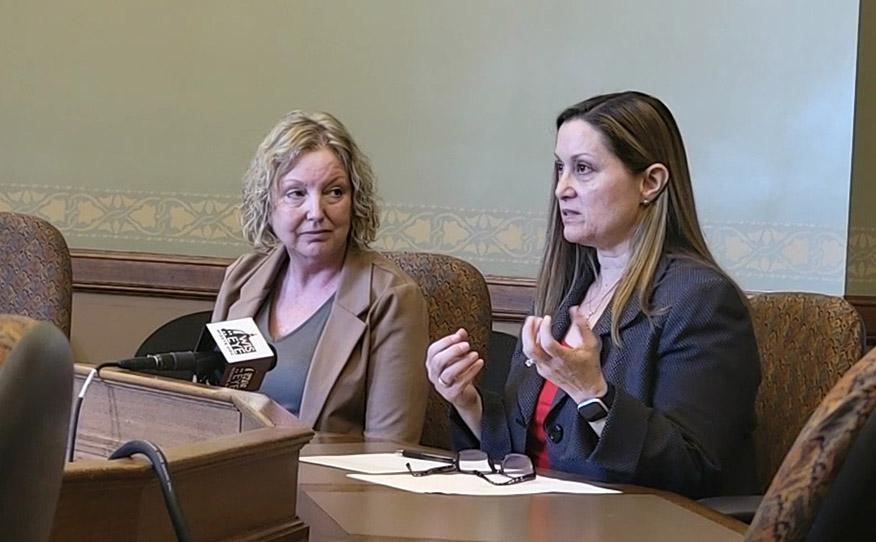On April 12, the Assembly Committee on Regulatory Licensing Reform held a public hearing on AB 144, legislation spurred by WHA to expedite licensure for new graduates of health care programs. The legislation is authored by Reps. Joy Goeben (R-Hobart) and Shae Sortwell (R-Two Rivers) and Sen. Rachael Cabral-Guevara (R-Appleton).

WHA’s Ann Zenk is joined by UW Health’s Leigh Larson to speak in favor of AB 144, legislation to expedite health care licensure for new graduates.
Modeled after 2021 Wisconsin Act 10, which allows health care professionals licensed and in good standing from another state to begin practicing immediately, this bill aims to do the same for new graduates of health care programs.
Specifically, it would allow new graduates of health care training programs that have passed their required national exam and cleared a criminal background check to begin practicing immediately if they have attested to completing everything required for licensure and have an employer offer them a job. The employer would also have to attest to the fact that the prospective employee has met all requirements for licensure, to the best of their knowledge.
Director of Graduate Medical Education and Medical Staff Administration for UW Health Leigh Larson spoke in support of the bill, and specifically addressed concerns related to safety. "Health care is a very regulated industry, and those of us involved in the credentialing of our workforce take these regulations by the State and agencies such as CMS and the Joint Commission very seriously. We already complete the credentialing requirements in AB 144 attested to by the employer as part of the previously mentioned regulatory requirements," said Larson. "In my department at UW Health, I am not aware of any physician denied a license by DSPS in my tenure, so the risk to patient safety should be very low," she added.
WHA Senior Vice President of Workforce and Clinical Practice Ann Zenk served as a member of the Wisconsin Legislative Council Study Committee on Occupational Licensure where the idea for this legislation originated. While highlighting the workforce challenges Wisconsin will continue to face, Zenk praised the Department of Safety and Professional Services for licensure reforms it has already begun, while also illustrating how the legislation would address continued challenges.
"As many of you know, there tends to be bi-annual licensure backlogs when new classes graduate both at the beginning of summer and end of the year," said Zenk. "The Department of Safety and Professional Services (DSPS) has made significant efforts to alleviate these challenges under the Evers administration, partly by implementing a new, and long overdue, electronic licensure system. Despite this forward-thinking measure, licensure backlogs still remain—backlogs that could be greatly reduced by duplicating the 2021 Act 10 fast-track process for new graduates," she added.
Chair Sortwell did not announce when he intends to have the committee take action on the legislation, but WHA will continue to work to get the legislation signed into law.
Contact WHA Vice President of Federal and State Relations Jon Hoelter with questions.